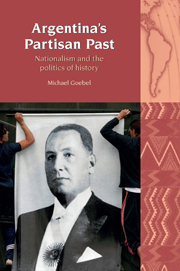Book contents
- Frontmatter
- Contents
- Acknowledgements
- List of acronyms and abbreviations
- Introduction
- 1 Argentina's two pantheons: from mitrismo to revisionism
- 2 Between co-optation and opposition: Peronism, nationalism and the politics of history, 1943–55
- 3 The deepening polarisation: the proscription of Peronism and its politics of history, 1955–66
- 4 The apogee of revisionism: nationalism, political violence and the politics of history, 1966–76
- 5 New narratives for a new era? Shifts, decline and resurgence of nationalist constructions of the past since 1976
- Conclusion
- Glossary
- Bibliography
- Index
2 - Between co-optation and opposition: Peronism, nationalism and the politics of history, 1943–55
- Frontmatter
- Contents
- Acknowledgements
- List of acronyms and abbreviations
- Introduction
- 1 Argentina's two pantheons: from mitrismo to revisionism
- 2 Between co-optation and opposition: Peronism, nationalism and the politics of history, 1943–55
- 3 The deepening polarisation: the proscription of Peronism and its politics of history, 1955–66
- 4 The apogee of revisionism: nationalism, political violence and the politics of history, 1966–76
- 5 New narratives for a new era? Shifts, decline and resurgence of nationalist constructions of the past since 1976
- Conclusion
- Glossary
- Bibliography
- Index
Summary
Introduction
Juan Domingo Perón rose to power under the military dictatorship that had been established with the coup of June 1943. Partly motivated by the desire to prolong Argentina's neutrality in the world war – thus allowing for the continuation of relations with the Axis powers – this government took its guiding ideas from nacionalismo. Some historians, for example David Rock or Alberto Spektorowski, have interpreted the coup of 1943 as the direct outgrowth and the culmination of nacionalista agitation in the preceding decade. Perón himself, both as an officer during the 1930s and as a leading participant in the 1943 coup, had also become acquainted with authoritarian nationalist ideas, and in his speeches and writings frequently drew on them. But with the defeat of fascism in most of Europe, Perón eventually opted to dilute and side-line nacionalismo, relying on the working class as his primary support base. He thus expounded a type of nationalism with marked popular overtones, expanding the notion of belonging to the nation to hitherto excluded groups, for example through the extension of higher education, the introduction of female suffrage or welfare programmes. While it is difficult to distil an unchanging Peronist ideology, Perón's ideas were closer to the popular nationalism that had been propagated by FORJA in the late 1930s, which eventually eclipsed the nacionalistas' stress on hierarchy, discipline and Catholicism. The bowdlerised fusion that Perón fashioned out of the various strands of nationalist thought that had emerged since the world Depression left a lasting imprint on Argentine politics and society.
- Type
- Chapter
- Information
- Argentina's Partisan PastNationalism and the Politics of History, pp. 65 - 107Publisher: Liverpool University PressPrint publication year: 2011



